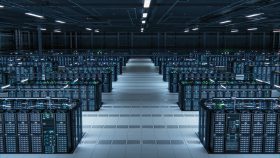Apple & Facebook Boost Jobs, Despite AI

A funny thing happened on the way to the robots. Apple and Facebook have created millions of jobs and appear to be on their way to creating many thousands more -- many of them in the United States -- despite the fear that artificial intelligence (AI) is rumored to be rapidly eliminating humans.
This trend counters the fears that tech jobs are moving overseas and that humans are being replaced with robots. Maybe the real answer is: Technology growth creates new jobs, both at home and abroad.
This week, Facebook CEO and Founder Mark Zuckerberg announced in a blog post that Facebook (FB) will be adding 3,000 people to its community operations teams around the world to fight fake news and dangerous content -- including murder videos -- with a focus on reviewing videos. Part of the pressure comes from recent incidents of murders being broadcast on Facebook Live.
In Apple's earnings conference call, Apple CEO Tim Cook said the company will create a $1 billion fund to boost advanced US manufacturing jobs. Apple says it has created two million jobs in the U.S.
These developments point to the complexity in how technology generates employment. Facebook's move is especially telling. So much attention has been focused on the use of AI to automate human tasks in datacenters. But if AI can really replace jobs, why does Facebook have to hire 3,000 people to look at videos? The answer is that apparently humans are still better at viewing and judging the intent of sophisticated content.
Here's what Zuckerberg said about the content reviewers:
"These reviewers will also help us get better at removing things we don't allow on Facebook like hate speech and child exploitation. And we'll keep working with local community groups and law enforcement who are in the best position to help someone if they need it -- either because they're about to harm themselves, or because they're in danger from someone else."
Most of the evidence from these large technology employers is that new jobs are being created, regardless of automation. For example, some of the most robust growth is in data science, where humans are still needed to direct the machines.
Apple continues to generate enormous job growth both in the U.S. and abroad. For example, a New York Times article from last year profiled the growth on an Apple campus in Austin, Tex., which has ballooned from 2,000 to 6,000 employees in seven years.
This trend is not limited to Apple nor Texas. Technology is boosting jobs around the United States in focused hot spots. Cities including Dallas, Phoenix, and Indianapolis are booming, with Dallas adding 15,000 tech jobs in the last two years, Phoenix nearly 8,000, and Indy nearly 5,000. Each city grew its tech employment by more than 9, 11.5, and 13.9 percent a year, respectively, according to a report from the Brookings Institute.
There is also strong growth in college towns like Madison, Wis.; Provo, Utah; and Raleigh, N.C. These cities have respective tech job growth rates of 11, 8.7, and 3.7 percent CAGR a year, according to Brookings. We'd also put in a word for our local city of Bozeman, Mont., which currently has strong tech job growth and under-3 percent unemployment rate. Other growing digital hot spots include Chicago, Washington, Pittsburgh, Kansas City, and Nashville (we're going to throw in Bozeman, Mont., just 'cause it should be there).
So despite the hype -- the robots don't appear to be taking away important tech jobs on the scale that is feared. And tech giants such as Apple and Facebook are still finding places to put humans to work.


















